It wasn’t until I moved to the French countryside that I was able to see just how much waste I was producing. Well, not just me. My husband contributed to the waste build-up as well, but less so than I did. While living and growing up in major American cities, I never paid much attention to the waste attached to my everyday consummation.
I wanted to help fight against Climate Change, but as a busy city-dwelling professional, recycling, foregoing a car, and sticking to a bicycle were pretty much the extent of my efforts.
But there, in our “new,” very old home tucked away in an isolated forest, getting rid of waste wasn’t as easy as tossing plastic bags into a large bin set outside of your home. We were responsible for taking our waste to the village’s collective “décheterie” or garbage disposal site. In those first several weeks, I helped my husband load the truck full of trash to be disposed of, and amongst the smell of damp earth and a chorus of chirping birds that called the forest home, I felt more and more… guilty.
Guilty that I could have gone so much of my life until that point without considering where my waste was going. Guilty that I wasn’t trying harder to do better, to consume less.
In the third month after our arrival to the forest in 2015, my husband and I made a conscious decision together to go all in. We wanted to free our consciences and start making more impactful moves that aligned with our motivations to seek countryside living in the first place. We were going to cut our waste dramatically. We would try not to create any at all.
Here are 9 things we do or have introduced to our lives to help us reduce waste:
Buying in Bulk
Our nearest city has a large organic market and a hypermarket, both with extensive bulk selections. Equipped with light as feather linen, tie string bags (homemade), we can collect many cupboard items without collecting the waste of conventional commercial packaging. Grains and cereals, nuts, dried fruit, snack foods, loose tea, and coffee are all stocked in our reusable linen bags then weighed and paid for. Once home, we unload the bulk items into XL mason jars for storage, freeing our bags for use when buying more bulk items or vegetables.
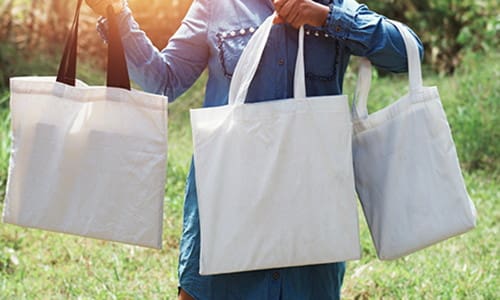
Grow Our Own Fruits, Veggies, and Herbs
We grow the things we tend to eat the most of, depending on the season, of course: cucumbers, tomatoes, zucchini, eggplant, green beans, pumpkins, leeks, asparagus, strawberries, apples, and yuzu lemons. Being sure that we put our focus and labor on the goods we love to keep on hand helps create a distance from the temptation to run to the store to grab our favorites.
We also grow, dry, and store various herbs and flowers for cooking and late-night tisanes.
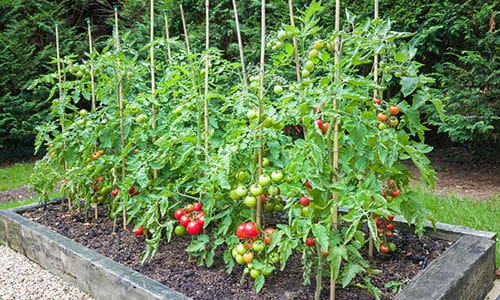
Chickens
We’re big egg lovers! We keep a small family of some fine-looking, clucky ladies in the yard, and we love them dearly. And what better last-minute dinner than an omelet made from some fresh eggs (and a crisp head of lettuce from the garden) from your backyard! Since we are so egg dependent, keeping chickens helps us avoid trips to the nearest store (a 20-minute drive) and helps us to dispose of our scraps and leftovers efficiently – the girls love their leftover treats once we’re wrapped up with our meals.
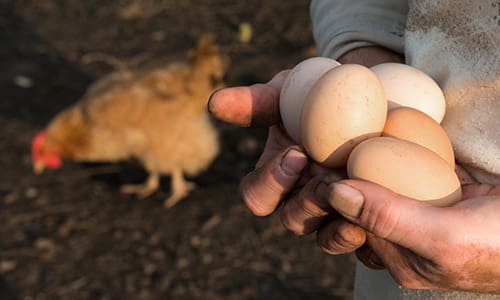
Seed Swaps and Fertilizer
About twice a year, we attend regional seed swaps. At these gatherings, gardeners and farmers share and swap various seeds for use in your gardens. Doing so, is not only a great way of obtaining tips from more experienced gardeners and professionals, but it keeps us out of the garden and homeware shops where people generally purchase seeds for their garden. For fertilizer, we use the waste of our animals as well as some from a neighbor.
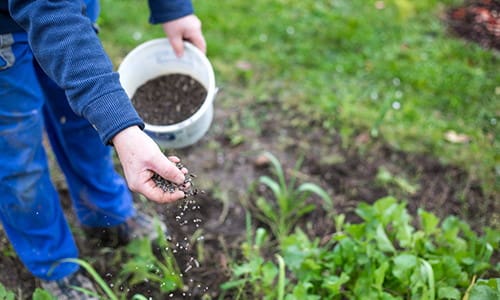
Local Farmers Markets
For everything that we do not, or can not grow, or produce on our own, we go to weekly Farmers Markets. We are very privileged because we live in a region where we can find a high-quality Farmer’s Market almost every day of the week in our neighboring villages. We are always sure to bring our linen bags for fruits and vegetables and reusable containers for meat and cheese. We also buy our milk and fruit juice, and wine from producers at the markets that use glass containers that we return each week when we go back for more.
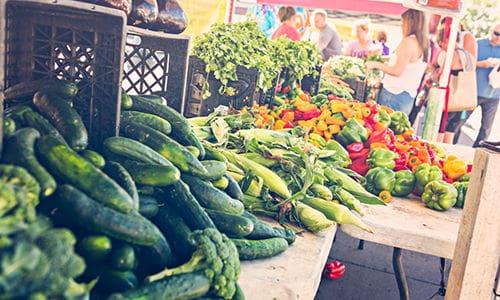
Buying Second Hand
Buying new is extremely rare for us. So instead, we buy absolutely everything second. Our car, garden tools, kitchenware, clothing, and more; we’re sure to give a second life to the abundance of items that are no longer wanted or needed by its initial owners.

Toiletries
When buying toiletries, we head to a local organic market with essentials such as shampoo, conditioner, hand & body soap, and lotion in bulk and accessible with reusable bottles. We often use the ashes from our wood stove to make our laundry soap (tip: essential oils help give a fresh scent equivalent to commercial brand detergent). I’m a loyal customer of an organic cosmetic store in the region that produces various cosmetics in-house and sells in reusable containers for makeup.
Related: If You Have This Plant in Your Backyard, You Will Never Run Out of Soap

Cloth Diapers
In 2017, our first of two children came along, and we were determined to set the example that waste and excessive purchases weren’t necessary when having a child. So, in addition to buying all baby essentials second-hand, we also stocked up on gently used cloth diapers that are still going strong today and in constant use by baby number 2. As a result, along with the help of cloth pads, we have eliminated the waste most associate with baby’s nappies.
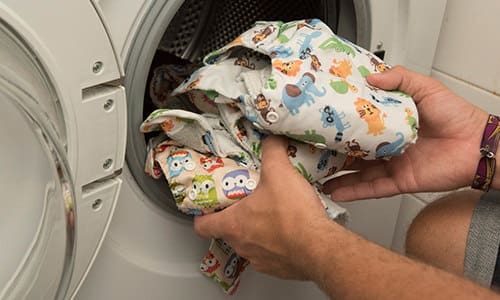
Compost
Of course, we never let anything go to waste. When preparing our food, we store all odd ends and organic waste in a small bin that we transfer to a larger container in the garden, once full.
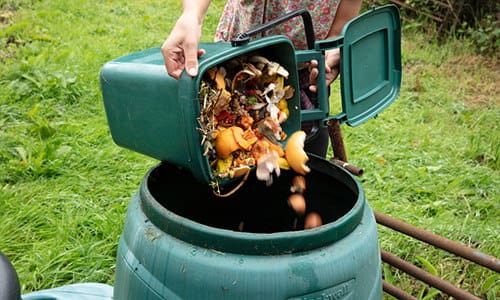
Understandably, the idea of going to Zero Waste can seem a daunting, absolutely time-consuming task. But with some patience, experimentation, and a lot of research on what’s accessible to you in your region, living a Zero Waste lifestyle or just focusing on drastically reducing your waste is attainable to all.
You may also like:
 How To Make Bio Fuel At Home From Leaves And Manure
How To Make Bio Fuel At Home From Leaves And Manure
The Succulent Red Plant That Tastes Like Bacon (Video)
9 Ingenious Uses For Old Tires
The Ultimate Guide To Composting
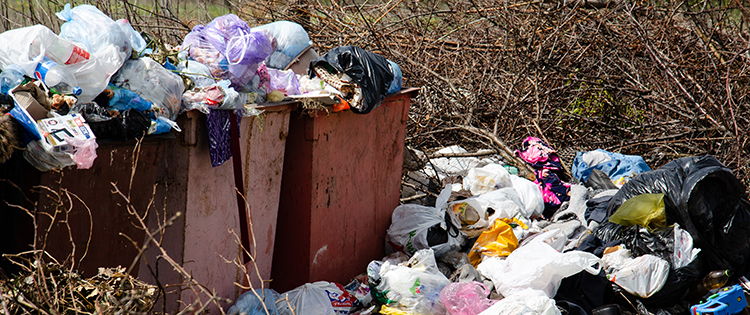

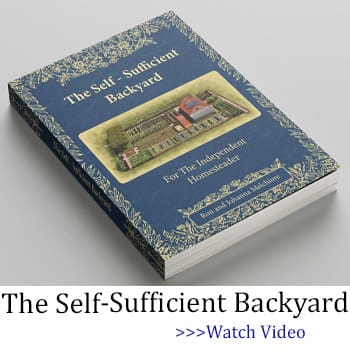


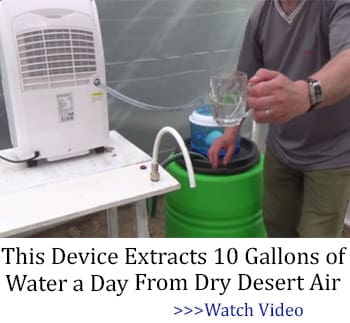
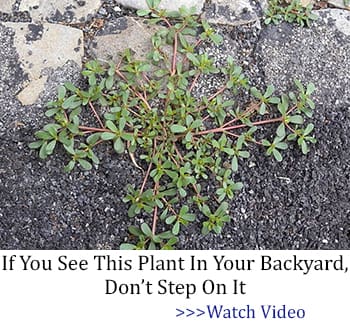
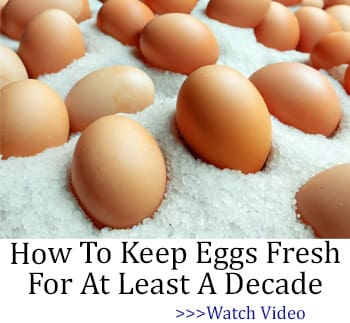

So many great tips!! Thanks!!
“Almost every American throws out 7 pounds of materials every day. Food alone comes in packaging that ends up making up almost half of every landfill. You have no say in this.”
Your email had the above statement inside. This is just not true. We have choice and we have the power to decide how we will buy certain items. For instance, produce often comes in plastic “clam shells”. I refuse to buy whatever is in one because I WILL NOT buy the packaging. Do without peaches? Yes. If I cannot buy peaches and put them in my cloth bags, I won’t buy peaches. Sure I love them. But not at the expense of the planet. We all have the power to not be spoiled, entitled consumers because we want to eat peaches.
I’m lucky. I have an extensive old garden and that allows me to eat good things without buying into the consumer packaging nightmare. I understand that others may live in an inner city apartment and don’t even have a balcony or patio to grow a few potted foodstuffs on. And it’s those folks who will be making the higher sacrifice in regards to our world. Those folks become the True Heroes on Gaia. When we can get farmer’s markets into more and more neighborhoods, those folks will also be able to eat well and eat mindfully. Get to know your neighbors! Three or four families can go in on a lug of fruit and split it among themselves. One simple cardboard or wooden box [if you’re lucky to get wood!] to be managed or re-purposed.
I know it’s easier for me as I live in a very small rural town with fields and forests around me, but often times organizing food purchasing projects can be easily done in a big city.
For inspiration, we have words by Patti Smith to remind us,
“That the people have the power
To redeem the work of fools
Upon the meek the graces shower
It’s decreed: the people rule.”
peace&light,
Robin